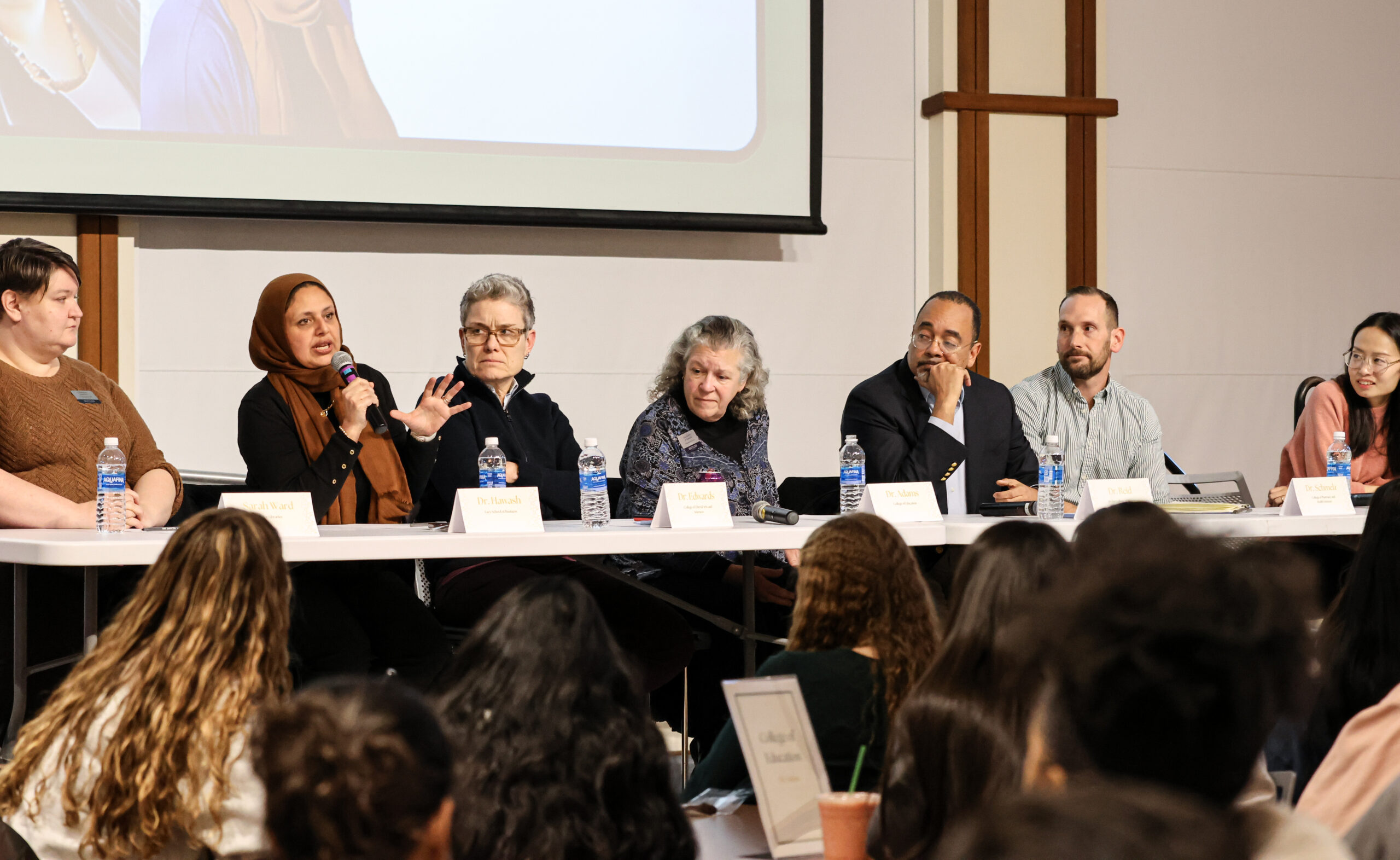Members of the faculty DEI panel from left to right: Sarah Ward, Ronia Hawash, Elise Edwards, Susan Adams, Derek Reid, Andrew Schmelz and Cynthia Chen. Photo by Jada Gangazha.
GRACE NUÑEZ | STAFF REPORTER | gnunez@butler.edu
Students gathered in the Reilly Room on the evening of Feb. 20 to hear from a panel of diversity, equity and inclusion (DEI) directors and faculty from six of Butler’s academic colleges and Butler Libraries. The DEI faculty panel served as an opportunity for students to learn more about the role of DEI faculty on campus — what they do, why they do what they do and how they work to make Butler’s campus a more diverse and inclusive environment.
In addition to a panel, there was time set aside at the end of the event for students to gather in small groups and discuss takeaways from the panel as well as to brainstorm ideas for how each college can continue to promote DEI on campus.
Amiia Burnett, a first-year speech, language and hearing sciences major, is a student whose experience at Butler has been positively impacted by the diverse organizations and overall sense of diverse community on campus.
“Being a student of color, [DEI organizations] have definitely made me feel more welcomed here because it is kind of hard being the only one in my class that looks like me,” Burnett said. “Having those communities that I can go to when I’m stressed out, when I just need somewhere to go, when I need some friendships, it keeps me motivated.”
Additionally, Burnett highlighted the value of attending the DEI faculty panel, and what was most surprising to learn at the panel. Getting to hear first-hand from faculty members how they are working to create change on campus was highly encouraging.
“Being a person that is trying to make [more] change, sometimes it feels like it’s only the students doing the work, and not really the professors,” Burnett said. “Hearing that [faculty] are doing things to reach the point of [full] equality and inclusion, it definitely was inspiring.”
Throughout the panel, faculty continually emphasized the importance and power of student voices when it comes to initiating and creating change, both on campus and beyond.
Susan Adams, a professor of education and the faculty director of diversity for the College of Education, is a firm advocate for encouraging students to use their voices as a tool.
“[Students] have a lot more power than they think they do,” Adams said. “You’re young and haven’t had many opportunities yet to exercise that power, but I hope that the learning space we cultivate here at Butler gives [students] a sense of what they might do if they all stood together around something that really matters to [their] generation.”
As a student, Burnett has first-hand experience with how speaking up can and does create change where change is needed or wanted. Being involved with the Black Student Union taught Burnett the value of getting involved with a club or organization, and initiating change to further enhance students’ experiences.
“If you want change, you have to be the change yourself,” Burnett said. “You can’t just sit back and wait for it to happen.”
Change comes about in many different ways, but students using their voices is something that continually inspires and encourages DEI faculty.
Cynthia Chen, an assistant professor of sports media and DEI faculty director for the College of Communication, highlighted how inspiring this is from a faculty perspective.
“[Faculty] are really encouraged when we see students build their own community, foster their own community and foster [their own] culture,” Chen said. “[Students] can say ‘This is a campus we want and this is a culture we want’ and [students] foster that, and [faculty] want to provide support for them.”
Adams further encouraged students to know that faculty are constantly working to make campus a more diverse and inclusive place, though it may not always feel like change is happening rapidly.
“[Faculty] are really working hard,” Adams said. “It’s perhaps maybe too invisible. You can’t see us directly, but I hope it’s encouraging to know that the university is invested in these roles and has sustained them, and that the work we’re doing in each of our colleges is rooted in what each college is prioritizing.”
Alongside faculty, students can continue to foster and cultivate a campus culture of diversity, inclusivity and equality by utilizing the resources that are here for students. This could look like reaching out to the DEI faculty that are here to serve students to seek out how to initiate change on campus or this could look like attending the many cultural organizations, clubs and events held throughout the semester.
Students can find more information on how to become involved with campus organizations on Butler’s Efroymson Diversity Center website.



